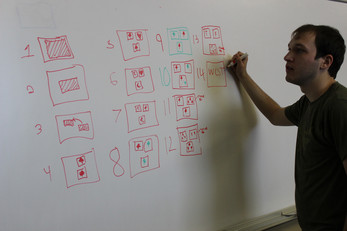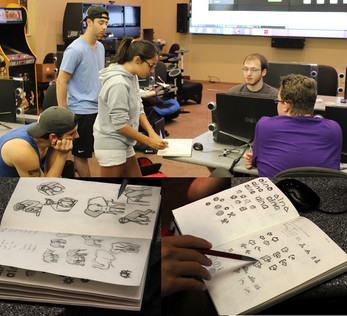
Aina
AINA
Aina is a digital psychological card sorting application based on the Wisconsin Card Sorting Task (WCST), designed to be used with non-human animals in order to test for presence of executive function. Students at High Point University work with Professor Brian Heagney and Dr. Joanne Altman to design and develop the mobile application.
The name "AINA" is a Swahili word that means both "species" and "sort", which is appropriate for a piece of software designed to test how various SPECIES of animals are able to SORT shapes, colors, and numbers.
EXECUTIVE FUNCTION
Executive Function refers to high-level cognitive skills related to making good choices, based on previous experiences as well as predictions of the future. For humans, taking and passing the WCST is a good indicator of whether or not someone is exhibiting executive functions.
Theoretically, having a non-human animal take the WCST would indicate whether it exhibits exectutive function. However, since non-human animals don't intuitively understand the rules or goals of the WCST, Aina was developed to train the animal for those rules.
Aina currently consists of 21 levels that slowly train an animal about what buttons are on a mobile device, as well as the rules about matching shapes, colors, and numbers.
CREDITS
- Dr. Joanne Altman: Animal Behaviorist
- Brian Heagney: Faculty Advisor
Spring 2018
- Brooke Espeliene: Design Documentation
- Zack Kamm: Research on animals and colors and asset creation
Spring 2016 - Summer 2017
- Ben Rolison: Programming, Puzzle & Level Design (awarded $1,000 grant to continue developing Aina during Summer 2017)
Summer 2016
- Kira Foglesong: Art, Design
- Ben Rolison: Programming
- Michael Smith: Programming
- Connor Gordon: Programming, Art
- Rico Bozzo: UI Design
Summer 2014 - Spring 2015
- Jerod Oakes: Programming, prototyping, level design, field work with gibbons and lemurs
Spring 2014
- Brandon Hicks: Research and early prototyping
- Ross Lemere: Research and early prototyping
- Jerod Oakes: Research and early prototyping
- Andrew Schaad: Research and early prototyping
- Kelley Yeager: Research and early prototyping
| Status | In development |
| Platforms | HTML5 |
| Author | Brian Heagney |
| Genre | Card Game |
| Made with | OpenFL |

